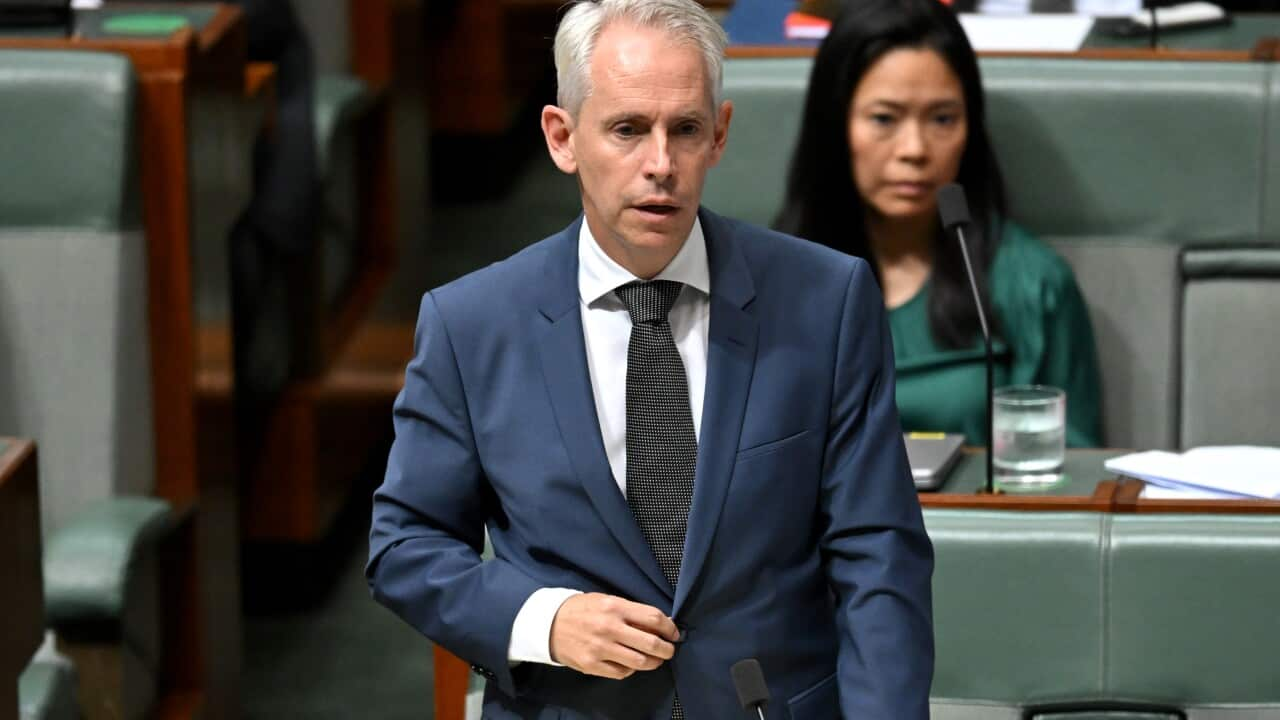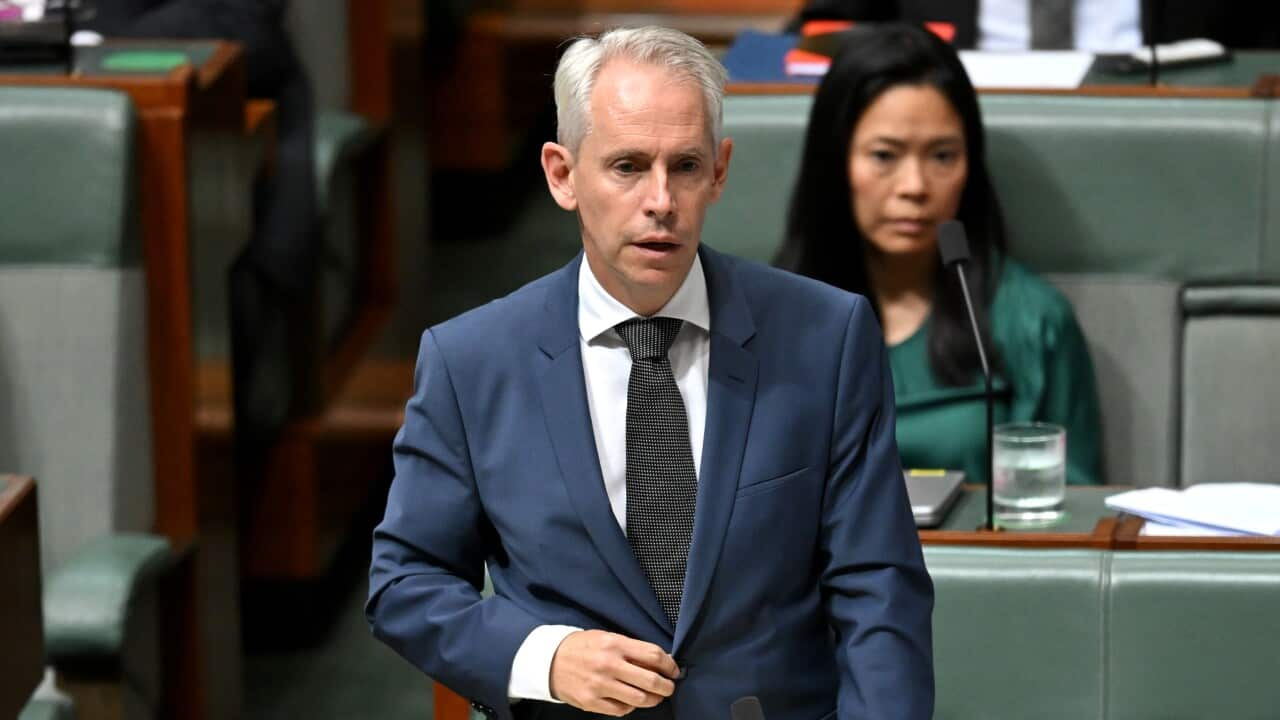The last few days have been filled with angst for Betia Shakiba and her mother, Bita — the latest stage in their "battle" for permanent protection in Australia.
"Every day, you face something new that is further marginalising this community," Shakiba, a refugee from Iran, told SBS News.
"I don’t know when this battle is going to end."
A 14-year-old Shakiba and her family came to Australia by boat in 2012.
Shakiba was granted a Safe Haven Enterprise visa (SHEV) around seven years ago and was deemed a refugee. She has since been issued with a permanent visa.
However, her husband — who arrived in Australia in 2010, aged 19 — and her mother remain in limbo.

Betia Shakiba (right) and her mother Bita, who came to Australia from Iran by boat in 2012. Source: Supplied / Betia Shakiba
"They mean the world to me. I wouldn’t be able to live without them," Shakiba said.
"To think of them getting separated from me … it’s just an awful nightmare that I’m hoping I will wake up from."
Shakiba’s mother said she feels "very scared", adding it’s "not safe for me in my country".
However, a "genuine fear of suffering persecution or significant harm" would not be considered a "reasonable excuse" to avoid criminal prosecution under the government’s now-stalled migration bill.
Labor has faced questions this week about the scope of the legislation and its attempt to rush it through parliament.
The changes could make a person’s failure to cooperate with government attempts to remove them a criminal offence and see countries that don’t accept the return of their own nationals subject to effective travel bans.
The laws would first be directed towards those in immigration detention on a Bridging visa R (BVR).
But there are concerns about how they might apply to the cohort of about 9,000 asylum seekers on bridging visas who have been denied refugee status .

Betia and her husband on their wedding day. Source: Supplied / Betia Shakiba
What are the proposed laws?
The bill proposes amendments to the Migration Act that seek to "strengthen" the framework around the "removal from Australia of certain non-citizens who are on a removal pathway", according to the explanatory memorandum.
It would enable the minister to give direction to a "removal pathway non-citizen" to do "specified things necessary to facilitate their removal".
The legislation would impose a mandatory minimum one-year prison sentence for those who do not cooperate with attempts to deport them. It also includes penalties of up to five years behind bars and a $93,000 fine.
The proposed legal changes come ahead of a High Court decision involving an Iranian citizen known as ASF17, who has made a bid for freedom.
The man is seeking to have an earlier High Court ruling — which found that indefinite immigration detention was illegal for those who could not be returned to a third country — extended to cover detainees who refuse to cooperate with their deportation.
Home Affairs Minister Clare O'Neil and department officials have not acknowledged any possible link between the upcoming legal decision and the seeming urgency with which Labor has tried to pass the legislation.
Concern bill will affect those trapped in 'fast-track' visa system
The bill would apply to those "required to be removed from Australia as soon as reasonably practicable", including current and future holders of a BVR visa and certain holders of a bridging visa (BVE).
When questioned during a Senate estimates hearing on Tuesday evening, Home Affairs secretary Stephanie Foster said the total number of people on BVEs was "very large" but clarified that "it would be quite a small proportion of those it would apply to".
Speaking on Wednesday, O’Neil said the laws would only apply to people who had exhausted all legal avenues to prove they were a refugee.
"They have lost every appeal, they have lost every court case and yet as it stands today, the Australian government does not have a power to compel those people to cooperate," she said.
But Jana Favero from the Asylum Seeker Resource Centre told SBS News she has been "inundated with calls, emails, texts from distressed people in the community who are worried about what will happen to them".

Betia Shakiba was in parliament on Tuesday for separate advocacy when the government introduced the proposed legislation. Source: Supplied / Lincoln Magee
for 31,000 people who arrived by boat before 2014, with those impacted put on temporary visas while the process played out.
About 19,000 people were recognised as refugees but there remains a backlog in the program.
'I couldn’t shake the fear and uncertainty'
Shakiba, who is a human rights lawyer, said she was in parliament "advocating for the basic rights for refugees" on Tuesday when the government unveiled the proposed changes.
"The day took a heartbreaking turn when another bill was passed (in the lower house), targeting those rejected under the fast-track system," she said.
The Coalition, Greens, and crossbench teamed up in the Senate on Wednesday It is now being scrutinised by a parliamentary inquiry which will report back on 7 May.
"This cruel and heartless attack on vulnerable members of our society left me feeling devastated. As I walked through the corridors, the weight of the situation brought tears to my eyes, and I couldn't shake the fear and uncertainty that gripped me," Shakiba said.
She said it left her feeling "helpless and overwhelmed, unsure of what the future holds for my family and others in similar situations".
The University of NSW’s Kaldor Centre said on Tuesday it is concerned the bill "could still lead to people who do have protection claims being forced to return to countries where their life or freedom is threatened".
The Refugee Council of Australia also has concerns that "those who do have strong claims, but have not had a fair hearing or review, will be sent back to real harm".
Could countries be 'blacklisted' under the laws?
The minister would also have the power to prevent those from certain countries that do not accept forced returns of their nationals from applying for Australian visas.
The bill creates power for the minister to designate a country as a "removal concern country", which would require consultation with the prime minister and foreign minister.
Department officials repeated that countries that do not cooperate with Australia include Iran, Iraq, South Sudan, and Russia.
When asked about further countries, Foster said: "I don’t have the list with me". She later said this was "loose wording", clarifying: "I do not have a list".
She said the designation of removal concern countries would be first used as a "leverage point" rather than a "blunt tool".
The Human Rights Law Centre argues this "broad" prohibition "will stop refugees from entering Australia, contrary to our international obligations".
It would also "inevitably and permanently separate families", the centre said, including those fleeing conflict and war.

Minister for Immigration Andrew Giles and Minister for Home Affairs Clare O’Neil at a press conference at Parliament House in Canberra on Wednesday. Source: AAP / Mick Tsikas
Government urged to 'seek a more humane approach'
An open letter signed by 17 Iranian community organisations described the government’s plan as a "chaotic and punitive response" that will "define its term".
They said the bill represents a "significant change in our approach to handling individuals who have sought refuge".
Wednesday was the last day parliament was sitting until after the upcoming High Court case on 17 April.
Opposition home affairs spokesperson James Paterson said if the case was made that the laws needed to be in effect before then, parliament could be reconvened.
The open letter says there is still time for the government to change course.
"We urge the government to repeal this proposed bill and seek a more humane and considered approach to immigration that respects the rights and aspirations of asylum seekers and refugees along with its own citizens who will be effectively unable to reunite with family members and relatives in Australia," the letter said.
This story has been produced with additional reporting from the Australian Associated Press, along with collaboration from SBS Persian's Niv Sadrolodabaee.












